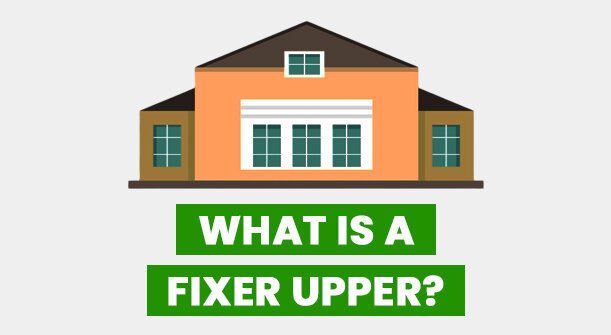
A fixer-upper is commonly used in the real estate industry to describe a property needing significant repairs or renovations. A fixer-upper can present challenges and opportunities for homeowners or home sellers. In this article, we will explore the perspective of the homeowner or home seller when dealing with a fixer-upper. You’ll learn how to sell your house fast in Detroit, Michigan without making repairs or pay realtor commissions.
What Is a Fixer Upper?
A fixer upper is a house that requires maintenance work (either minor or significant) to improve its condition. It ranges from small repairs and quick updates to more complex renovations like tearing down walls or adding new rooms.
The idea is that you are selling the property at a lower price point due to its need for work, offering potential home buyers the opportunity to purchase it for less than market value and invest in improvements themselves.
The appeal of a fixer-upper lies in its potential for return on investment. Cash home buyers, investors, or homeowners often seek out these kinds of properties, seeing them as opportunities to increase the home’s value through their own labor or by hiring professionals to do the work.
Assessing the Property
When faced with a fixer-upper, the first step for homeowners or home sellers is to assess the property and determine the scope of repairs required. It may involve hiring a professional inspector or contractor to identify any structural issues or major repairs needed. You should have a thorough understanding of the property’s condition before proceeding.
Consider the cost of fixing the property. Common expenses include
- Building materials
- Labor
- Permits
- Unforeseen structural, system, or foundation costs
By estimating the cost of repairs, homeowners can make an informed decision about whether or not to proceed with the project.
Before deciding to sell, homeowners need to research the market value of similar properties in the area and determine if the cost of repairs will be recouped through a higher selling price. Weigh the potential profit against the expenses involved in the renovation process.
Factors to Consider When Selling a Fixer Upper
After assessing the property, homeowners must carefully weigh the pros and cons of selling a fixer-upper.
- On one hand, selling a property needing repairs may attract a smaller pool of buyers and require a longer time on the market.
- On the other hand, selling a fixer-upper can offer the opportunity to sell at a lower price and potentially attract buyers looking for a project.
Renovating a fixer-upper requires time and effort. Homeowners must consider if they have the resources and willingness to invest in the renovation process. It includes managing contractors, overseeing the repairs, and dealing with any unexpected issues that may arise. Time and money are important factors to consider when deciding whether or not to take on a fixer-upper.
You may decide that selling a fixer-upper is not the best option. Instead, you may explore options like renting the property or financing the repairs. It allows you to increase the property’s value before selling it. Carefully consider all available options before making a decision.
Marketing and Selling Your Fixer Upper
When marketing a fixer-upper, highlight the property’s potential. You can do it through professional staging, virtual tours, or showcasing before-and-after photos of similar renovations. By showcasing the possibilities, you attract buyers willing to take on the challenge of a fixer-upper.
Pricing a fixer-upper can be challenging. Consider the cost of repairs, the current market conditions, and the potential return on investment. Working with a real estate agent may ensure the property is priced competitively.
Selling a fixer-upper involves negotiating with potential buyers. Buyers may request a lower price due to the repairs needed or ask for concessions such as seller credits or repairs to be completed before closing. Homeowners must be prepared to negotiate and make decisions that align with their goals. Know your bottom line when negotiating with a home buyer.
What Is the Best Way to Sell a Fixer Upper?
There are several ways to sell a fixer-upper; the best approach depends on the homeowner’s goals and circumstances.
Traditional Home Sale
A traditional home sale involves:
- Listing the property with a real estate agent and.
- Going through the standard marketing process.
- Negotiating with potential buyers.
- Closing the sale.
This method can be effective for homeowners willing to invest time and money to prepare the property for sale and navigate the traditional real estate market.
For Sale by Owner (FSBO)
For homeowners who prefer a more hands-on approach, selling a fixer-upper without an agent can be an option. It involves taking on the responsibility of marketing the property, negotiating with buyers, and handling the paperwork involved in the sale. While this method can save on agent commissions, it requires a significant amount of time and effort from the homeowner.
Cash Home Sale
A cash home sale may be the best option for homeowners who want to sell quickly and avoid the hassle of repairs and renovations. Cash home buyers are investors who purchase properties in their current condition, allowing homeowners to sell without making any repairs or upgrades. While the selling price may be lower than the market value, a cash sale’s convenience and speed can appeal to homeowners in certain situations.
We Buy Houses in Detroit, Michigan
If you need to sell your house fast but don’t want the hassle of a traditional home sale, contact M1 Home Buyers. We buy houses as-is. No repairs are needed. Avoid closing costs and realtor commissions. Close in as little as seven days. Call 248-397-5800 to get a fast cash offer from our local home buyers.

